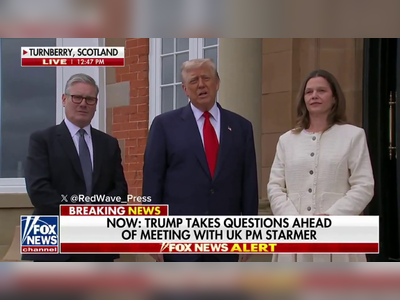
First Group of White South Africans Granted Refugee Status Arrives in the United States
The arrival of 59 Afrikaner refugees at Dulles Airport follows controversial policies enacted by the Trump administration.
The first group of white South Africans, specifically Afrikaners, granted refugee status under the Trump administration has arrived in the United States, generating significant controversy regarding their status and the implications of U.S. immigration policies.
The group, consisting of 59 adults and children, was welcomed at Dulles International Airport by U.S. Deputy Secretary of State Christopher Landau and Deputy Secretary of Homeland Security Troy Edgar, who handed out U.S. flags to the new arrivals.
Landau expressed honor and happiness in welcoming them, drawing a parallel between their situation and his own family's history of fleeing Europe during the Nazi regime.
He emphasized that the U.S. rejects persecution based on race and framed the arrival as a statement against such discrimination in South Africa.
This development coincided with the termination of legal protections for Afghan nationals previously afforded by the U.S. government, which cited improved security in Afghanistan under Taliban rule.
Landau noted that the Afrikaners were being resettled as they could be "easily assimilated into our country," contrasting them with the Afghan refugees.
The acceptance of white South Africans has drawn sharp criticism, particularly in South Africa, where President Cyril Ramaphosa stated that he had communicated to Trump that the information leading to this decision was misleading.
Ramaphosa highlighted existing socioeconomic disparities, noting that, historically, white South Africans possess twenty times the wealth of their Black counterparts, who face an unemployment rate of 46.1%, compared to 9.2% for white individuals.
Critics, including members of the Democratic Party, have condemned the resettlement policy.
Maryland Senator Chris Van Hollen described the actions of the Trump administration as a "global apartheid policy," arguing that it undermines the foundational values of the United States.
Additionally, Laura Thompson Osuri, the executive director of Homes Not Borders, a Washington-area refugee nonprofit, criticized the classification of Afrikaners as refugees, emphasizing that true refugees are those fleeing immediate threats like persecution, war, or violence.
In a broader reflection of this policy shift, the Episcopal Church announced it would discontinue its partnership with the U.S. government in refugee resettlement efforts, citing the need to uphold commitments to racial justice and reconciliation while opposing the preferential treatment based on race.
This resettlement initiative follows Trump's earlier measures, including a suspension of the U.S. refugee settlement program, which left over 100,000 approved refugees waiting for resettlement.
Subsequent to the suspension, an executive order prioritized Afrikaners for refugee status, amidst claims from Trump regarding a purported genocide against them in South Africa—claims that are contested and associated with far-right narratives.
Trump asserted that he would not attend a scheduled G20 leaders' meeting unless the situation in South Africa was "taken care of."
The group, consisting of 59 adults and children, was welcomed at Dulles International Airport by U.S. Deputy Secretary of State Christopher Landau and Deputy Secretary of Homeland Security Troy Edgar, who handed out U.S. flags to the new arrivals.
Landau expressed honor and happiness in welcoming them, drawing a parallel between their situation and his own family's history of fleeing Europe during the Nazi regime.
He emphasized that the U.S. rejects persecution based on race and framed the arrival as a statement against such discrimination in South Africa.
This development coincided with the termination of legal protections for Afghan nationals previously afforded by the U.S. government, which cited improved security in Afghanistan under Taliban rule.
Landau noted that the Afrikaners were being resettled as they could be "easily assimilated into our country," contrasting them with the Afghan refugees.
The acceptance of white South Africans has drawn sharp criticism, particularly in South Africa, where President Cyril Ramaphosa stated that he had communicated to Trump that the information leading to this decision was misleading.
Ramaphosa highlighted existing socioeconomic disparities, noting that, historically, white South Africans possess twenty times the wealth of their Black counterparts, who face an unemployment rate of 46.1%, compared to 9.2% for white individuals.
Critics, including members of the Democratic Party, have condemned the resettlement policy.
Maryland Senator Chris Van Hollen described the actions of the Trump administration as a "global apartheid policy," arguing that it undermines the foundational values of the United States.
Additionally, Laura Thompson Osuri, the executive director of Homes Not Borders, a Washington-area refugee nonprofit, criticized the classification of Afrikaners as refugees, emphasizing that true refugees are those fleeing immediate threats like persecution, war, or violence.
In a broader reflection of this policy shift, the Episcopal Church announced it would discontinue its partnership with the U.S. government in refugee resettlement efforts, citing the need to uphold commitments to racial justice and reconciliation while opposing the preferential treatment based on race.
This resettlement initiative follows Trump's earlier measures, including a suspension of the U.S. refugee settlement program, which left over 100,000 approved refugees waiting for resettlement.
Subsequent to the suspension, an executive order prioritized Afrikaners for refugee status, amidst claims from Trump regarding a purported genocide against them in South Africa—claims that are contested and associated with far-right narratives.
Trump asserted that he would not attend a scheduled G20 leaders' meeting unless the situation in South Africa was "taken care of."












